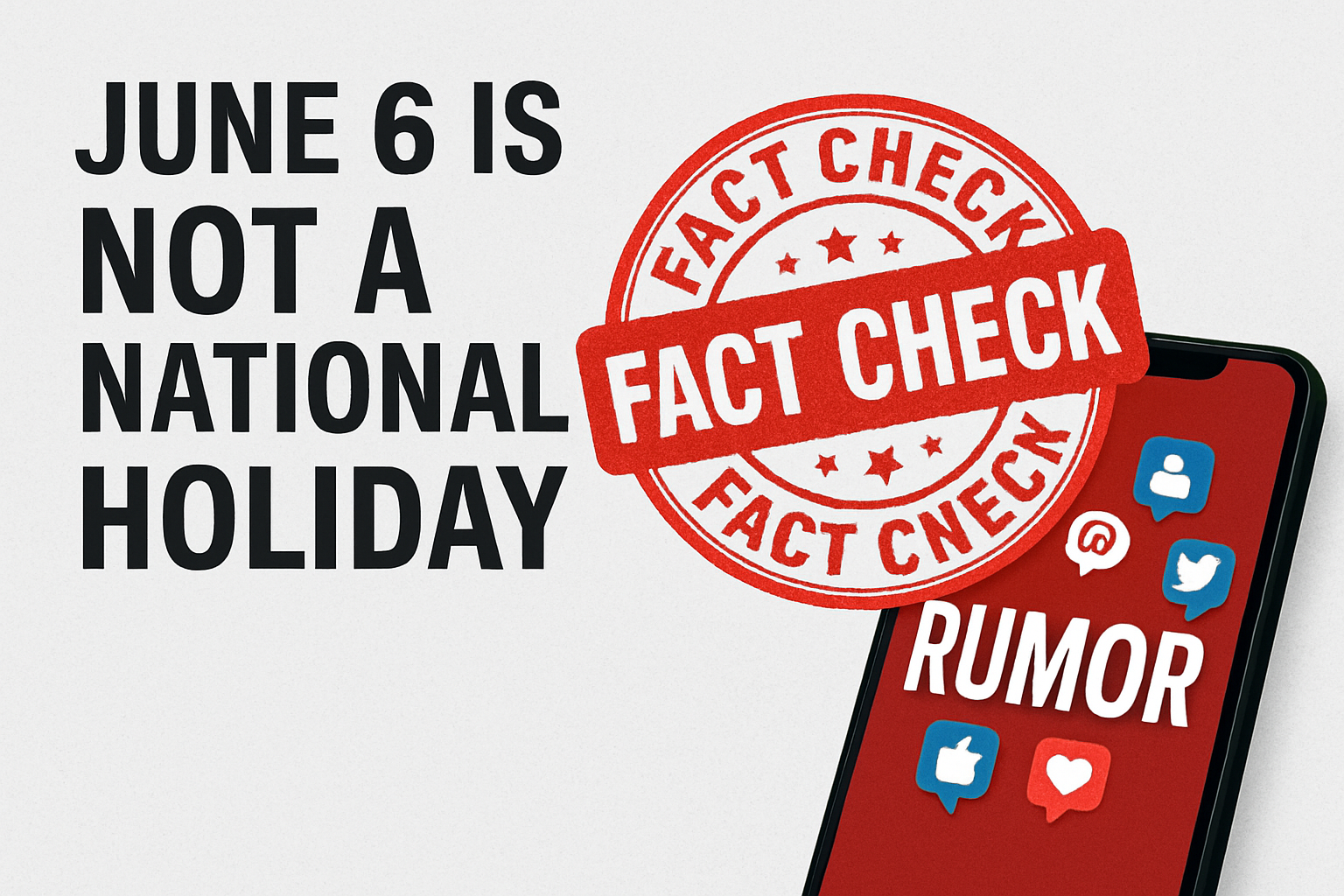Fact Check
June 6 Public Holiday Rumors Debunked: PIB Confirms No National Holiday
Amid a wave of social media posts and forwarded messages, a claim recently gained traction suggesting that June 6, 2025, is a national public holiday in India. This led to widespread confusion, particularly among students, government employees, and corporate professionals. However, the Press Information Bureau (PIB) has stepped in to clarify the truth — and the verdict is clear: June 6 is not a public holiday.
What Sparked the Confusion?
The viral message, circulated widely across WhatsApp, Facebook, and X (formerly Twitter), stated that the Government of India had declared June 6 a public holiday in observance of Eid-ul-Adha (Bakrid). While the intent might have been to inform, the facts were inaccurate and misleading.
The Official Clarification
The Press Information Bureau (PIB), India’s official fact-checking arm for government-related misinformation, issued a public statement confirming that no such holiday had been declared for June 6, 2025. According to PIB:
“A message circulating on social media claims that June 6, 2025, is a public holiday declared by the government. This is fake. No such notification has been issued.”
This clarification was also supported by the Ministry of Personnel, Public Grievances, and Pensions — the official authority for releasing the list of gazetted holidays.
Actual Date for Eid-ul-Adha
The confusion largely stemmed from the Eid-ul-Adha celebration, which varies based on moon sightings. For most parts of India, Eid-ul-Adha will be celebrated on Saturday, June 7, 2025. Some regions, such as Kerala, may observe the festival on a different day due to local moon sighting differences.
Why It Matters
Misinformation related to public holidays can lead to disruptions in work schedules, school operations, and travel plans. In this case, many institutions had to issue last-minute updates to clarify that June 6 would proceed as a normal working day.
How to Avoid Falling for Fake Holiday News
- Always verify with official sources such as government websites or credible news portals.
- Follow PIB Fact Check on X (@PIBFactCheck) for real-time updates on misinformation.
- Cross-check with the gazetted holiday list released annually by the government.
Fact Check
Pakistan Field Marshal Asim Munir Gifts Morphed Chinese Drill Photo

Quick Recap
At a high-profile celebratory dinner marking “Operation Bunyan‑un‑Marsoos” against India, Pakistan’s newly appointed Field Marshal Asim Munir gifted Prime Minister Shehbaz Sharif a framed photo—claimed to show Pakistan’s attack. However, the image was from a 2019 Chinese military exercise, robbing the gesture of its credibility

What Really Happened
- External fact-checking revealed the photo depicted the Chinese PHL‑03 rocket launcher, used during PLA exercises circa 2017–2019
- The image circulated widely online, quickly traced through reverse image tools to Chinese military sources .

Social Media Backlash
Netizens in Pakistan and abroad called out the gaffe with viral memes and remarks:

Political & Strategic Criticism
Indian MPs, including Asaduddin Owaisi, branded Munir and Sharif “stupid jokers” (मुर्ख जोकर), criticizing the misinformation effort
The incident also intensified scrutiny over Munir’s elevation to Field Marshal shortly after the conflict with India—seen by critics as lacking in genuine military achievement

China Ties & Propaganda
Some analysts suggest using a Chinese image was a calculated move to acknowledge Pakistan’s close military alliance with China, even if it meant passing off foreign visuals to claim a domestic triumph
Fact Check
June 6 is not a national holiday, clarified by PIB after fake social media claims

On March 20, 2024, the Government of India officially designated the Press Information Bureau’s (PIB) Fact Check Unit (FCU) as the authorized fact-checking body under the Information Technology (Intermediary Guidelines and Digital Media Ethics Code) Rules, 2021 (IT Rules 2021). This move aims to combat the spread of misinformation related to the Central Government’s activities across digital platforms

Legal Framework and Mandate
The notification, issued by the Ministry of Electronics and Information Technology (MeitY), empowers the PIB FCU to identify and flag online content that is “fake,” “false,” or “misleading” concerning any business of the Central Government. This authority is granted under sub-clause (v) of sub-rule (1) of Rule 3 of the IT Rules 2021
Operational Scope
Established in November 2019, the PIB FCU’s primary objective is to deter the creation and dissemination of fake news and misinformation pertaining to the Government of India. The unit actively monitors, detects, and counters disinformation campaigns, ensuring that false information about the government is promptly exposed and corrected
Implications for Digital Platforms
Under the IT Rules 2021, intermediaries like social media platforms are obligated to make reasonable efforts to not host or publish information that has been identified as false by the government’s fact-check unit. Failure to comply may result in the loss of “safe harbour” protections, which shield platforms from liability for user-generated content
Public and Legal Reactions
The notification has sparked debates concerning press freedom and potential censorship. Critics, including the Editors Guild of India and the News Broadcasters & Digital Association, argue that granting the government authority to determine the veracity of information could suppress dissent and legitimate criticism
Legal challenges have been mounted against the notification. Notably, comedian Kunal Kamra filed a petition in the Bombay High Court, contending that the amendments could be used to silence government critics under the guise of combating fake news .
The Supreme Court of India has since stayed the Union Government’s notification on the PIB Fact Check Unit, citing concerns over freedom of speech and expression .
Conclusion
The formal notification of the PIB’s Fact Check Unit under the IT Rules 2021 represents the government’s intensified efforts to address misinformation related to its operations. However, the move has ignited significant discourse on the balance between combating fake news and upholding democratic freedoms. As legal proceedings continue, the ultimate impact of this development on India’s information ecosystem remains to be seen.
Fact Check
Top 10 Important Laws in India Everyone Should Know

India, with its rich legal heritage, has a vast and intricate judicial system. Whether you’re a student, a working professional, or a homemaker, knowing key laws can protect your rights and help you make informed decisions. Here’s a look at the top 10 laws in India that every citizen should be aware of.


1. Right to Information Act (RTI), 2005
- Purpose: Empowers citizens to request information from government departments.
- Why it matters: Ensures transparency and accountability in public offices.
2. Indian Penal Code (IPC), 1860
- Purpose: Defines crimes and prescribes punishments.
- Why it matters: Forms the backbone of criminal law in India.
3. Consumer Protection Act, 2019
- Purpose: Protects the rights of consumers against unfair trade practices.
- Why it matters: You can file complaints about faulty products or services.
4. Right to Education Act (RTE), 2009
- Purpose: Guarantees free and compulsory education to children aged 6–14.
- Why it matters: Ensures access to education as a fundamental right.
5. Motor Vehicles Act, 1988 (Amended 2019)
- Purpose: Regulates traffic laws and penalties.
- Why it matters: Sets rules for road safety and vehicle operation.
6. Protection of Women from Domestic Violence Act, 2005
- Purpose: Shields women from physical, emotional, and economic abuse.
- Why it matters: Provides legal remedy and protection to affected women.
7. Right to Equality – Article 14 of the Constitution
- Purpose: Ensures equal protection of the law and equality before the law.
- Why it matters: Guards against discrimination of any kind.
8. Hindu Succession Act, 1956
- Purpose: Governs inheritance and succession among Hindus.
- Why it matters: Provides equal inheritance rights to daughters and sons.
9. Sexual Harassment of Women at Workplace (Prevention, Prohibition and Redressal) Act, 2013
- Purpose: Addresses sexual harassment at work.
- Why it matters: Provides a structured grievance redressal mechanism.
10. Information Technology Act, 2000
- Purpose: Regulates cyber crimes and electronic commerce.
- Why it matters: Important in the age of social media and online transactions.
-

 News4 weeks ago
News4 weeks agoEx-Cricketer Shikhar Dhawan Buys Ultra-Luxury Apartment Worth ₹69 Crore in Gurugram
-

 News1 month ago
News1 month agoIndia offers zero-for-zero tariffs on auto parts, steel from US
-

 Sports1 month ago
Sports1 month agoIPL 2025 Suspended: IPL suspended for only this many days? BCCI told when the tournament will start again!
-

 News1 month ago
News1 month agoOperation Sindoor Live Updates: Pakistan used Turkey-made drones to target 26 locations, military sites in north India
-

 News1 month ago
News1 month agoDefence Minister Rajnath Singh Arrives In Srinagar, To Review Overall Security Situation In J&K
-

 Sports1 month ago
Sports1 month agoWho will replace Virat Kohli at No. 4 for India in Test cricket?
-

 News1 month ago
News1 month ago24 airports shut, airlines issue travel advisories amid tensions between India-Pakistan
-

 Sports1 month ago
Sports1 month ago‘Will Remember Tears You Never Showed’: Anushka Sharma’s Emotional Tribute On Virat Kohli’s Retirement













